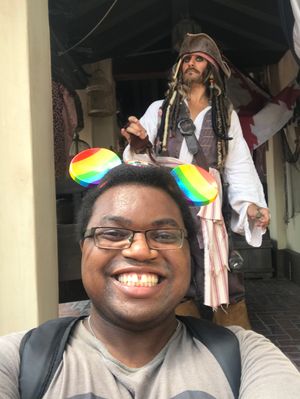So the retheme of Splash Mountain to Tiana's Bayou Adventure was announced this past month at EssenceFest and many Disney fans have been very...vocal over the decision.
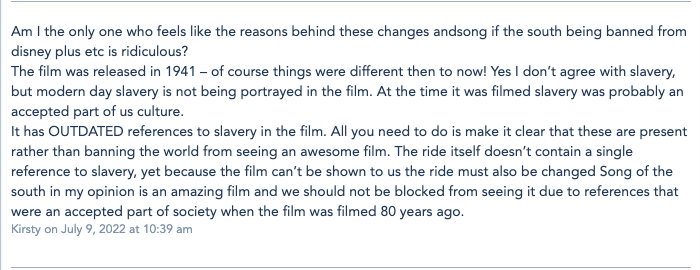 So wants to hear the backstory of Song of the South, the plantation tradition, and how the film is a perfect example of the many tactics being used even today to whitewash history and race relations? For no reason whatsoever!
So wants to hear the backstory of Song of the South, the plantation tradition, and how the film is a perfect example of the many tactics being used even today to whitewash history and race relations? For no reason whatsoever!
Alright, picture it - November 12, 1946. You and your family have just sat down in the Fox Theater in Atlanta, Georgia. It's the premiere of a brand new Walt Disney film - another mixed live-action and animated spectacular. Your family is excited to see the new Disney feature film, especially with the shadows of WWII and the terror of the Nazi regime still looming large over the average American. The need for normalcy and the wonder of Disney animation trumps any of the scandals around the film.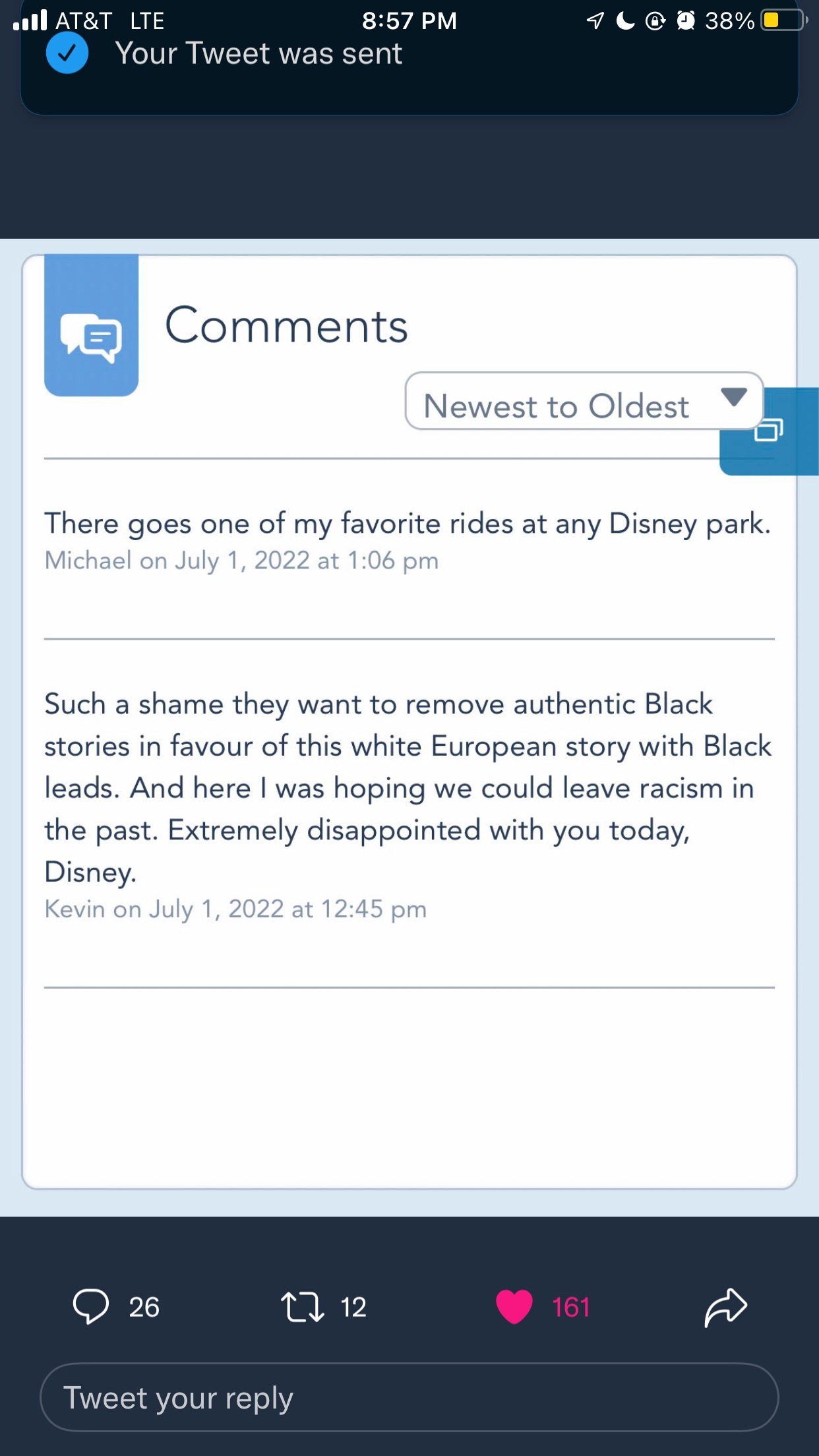
A hush falls over the crowd as the man, the legend himself Walt Disney comes to stand before the screen. He warmly welcomes everyone and proceeds to introduce the cast of the film who wave and greet the audience. While minus the ones who didn't come due to Atlanta's laws. But that was only a blip of observation before Walt finished his remarks and then left the room as the lighting dimmed and the picture started. You and your family paid him no mind - the news already said how Walt didn't like unexpected audience reactions. Which you thought was foolishness! Why Walt Disney produced some of the finest films in Hollywood and they were always a delight. Surely this would be another instant classic for the ages!
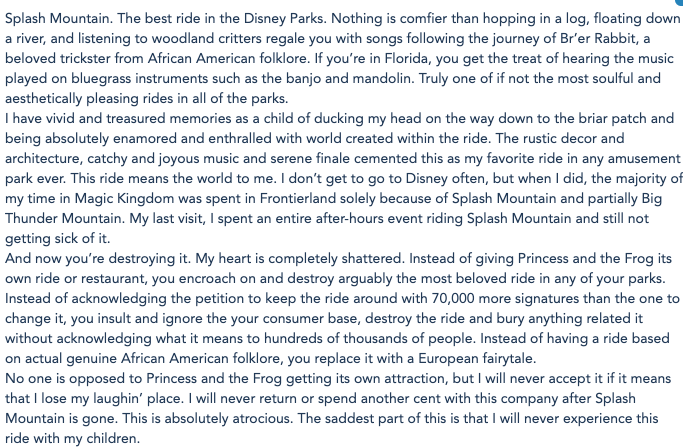
Which is what you and your family think as the opening song "Song of the South" filled the room. All giddy with excitement and thinking another classic is being born... up until the opening shot of a plantation with happy, smiling Black people working in a field. When "Song of the South" was released, white critical reception was very mixed. Oh, critics praised the music and the animation! But the story itself? And the setting? And the racial dynamics?

Even Time magazine wrote: "Tattered ol' Uncle Remus, who cheerfully "knew his place" in the easygoing world of late 19th Century Georgia (Author Harris, in accepted Southern fashion, always omitted the capital from the word "Negro"), is a character bound to enrage all educated Negroes, and a number of damyankees." https://t.co/p4O0iEORbT?amp=1
And the reviews were just as mixed - if not more so - among the African American press in the US. Ranging from Richard. B. Dier calling the film a "vicious a piece of propaganda for white supremacy as Hollywood ever produced “to views like Herman Hilll who felt the film would be goodwill in furthering of interracial relations and that criticism was the "unadulterated hogwash symptomatic of the unfortunate racial neurosis that seems to be gripping so many of our humorless brethren these days" Oof!
But it's Charles Solomon's review of the flim following its 1986 release that unintentionally get to the heart of the problem with this film as it is "essentially a nostalgic valentine to a past that never existed, and within those limits, it offers a pleasant, family diversion for holiday afternoons when the children get restless." https://t.co/6MFCV4M3n9?amp=1
"A nostalgic valentine to a past that never existed" brilliantly sums up one of the core issues with "Song of the South" as it paints a romantic vision of America's past and relations between white plantation owners and Black sharecroppers that never existed. And that is precisely because Dalton Raymond, the Louisiana State University professor Walt Disney hired the write the screenplay for the film, believed and supported this white supremacist myth and wasn’t discreet about being a racist.
Like even The Hays Code office having to have him remove offense terminology from his outline racist racist.
Trying to tamper Reymond's...issues and wanting a consultant on the screenplay, Disney hired Clarence Muse- the first African American to appear in a starring role in a film with the 1929 classic "Hearts in Dixie". Surely nothing could go wrong with that pairing! Reymond refused to listen to Muse to portray the Black characters in the screenplay in ways that allowed them to be dignified, realized people and shortly quit after his hiring. Muse then wrote letters to editors of multiple black publications with his concerns of the script.
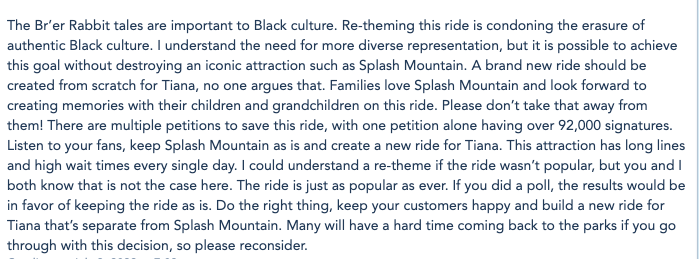
In addition to all the messiness there both the executive secretary of the NAAC Walter white at the time, and the director of the American Council on Race Relations, June Blythe, were denied requests to see treatment for the film. But Walt had a solution to the mess: they would hire another screenwriter to help curb Reymond and make his work into a more appropriate screenplay! And so they did ...by hiring Maurice Rapf, a Jewish uncredited screenwriter from Walt's 1950's classic Cinderella. Again the answer to the bigotry of a racist white screenwriter was to give him another minority consultant to correct his work. Which lasted all of seven weeks wherein after a dispute with Reymond, unsurprisingly Maurice Rapf left the project.
But we have Maurice Rapf to thank for doing a crucial service for the film: he not only removed many of the offensive phrasing Reymond tried to place into the film but also added dialogue to make it clear that the film is set AFTER slavery ended. Reymond had it DURING slavery. Because Dalton Reymond and many within the south at this time and even still today believe in the Plantation Tradition, a false belief system built on the ideology of the Lost Cause of the Confederacy.
That's where the South wasn't fighting for slavery but state rights and freedom, denying the horrors of slavery to only a few bad apples (sound familiar of another institution?) and viewing slaves as workers and beloved members of their master's family who "have their place". A brilliant example of the Plantation tradition is "Gone with the Wind" and Scarlett's relationship to her slave nanny and slavery in general, the views on the Civil War, and how the reconstruction era mobility of Black characters afterwards is viewed negatively. This influence can be seen in "Song of the South" with the relationship Uncle Remus has with Johnny, the white main character of the film, and his family where while not employed by Johnny's family, there is a distinct power imbalance between him and Johnny's folks. As well as the Black sharecroppers being cheerful about their place and Uncle Remus sharing traditional African stories for the entertainment of Johnny and his friends as well as to teach Johnny to accept his situation. Which is a lot better off than Remus and the others.

This also speaks to the disconnect of the Brer Rabbit stories themselves and being of rebellion, trickery, and escaping Brer Fox and Brer Brer who historically are positioned to take the place of slave owners in African American folklore and those stories then being used as entertainment and life lessons for said descendants of slave owners by Black characters who are clearly in worse conditions than the owners of the plantation they're sharecropping. And that gets to the main problem that would've sunk "Song of the South" anyway even if Dalton Reymond hadn't muddied it up with his racism. The inspiration text of the film - the Uncle Remus stories by Joel Chandler Harris- was made by a white author for white audiences.
And who collected African American folklore - folklore that was used to preserve a culture and heritage that the transatlantic slave trade, Christianity, and White supremacy sought to extinguish within chattel slavery, folklore that inspired resistance movements across the diaspora in the Americas, that kept family traditions alive, that inspires Black art and media across the diaspora even to this day - for consumption for white audiences who missed the stories their Black nannies told them. Our culture and heritage were consumed for white audiences who craved the comforts of a childhood being in the arms of Black women and in the company of Black little boys and little girls. Whose memories and nostalgia went side by side to generational pain and suffering.

The Uncle Remus stories were never written for Black audiences in mind nor are we even centered in the stories themselves but instead an invisible, nameless White child who comes to Uncle Remus for advice and life lessons he's learned as a freedman is centered in the text. It's also why its mainly white audiences and older generations of fans who don't see the subtle racism and history of racism that's brought them "Song of the South" and vehmonantly oppose the Princess and the Frog replacement coming for Splash Mountain. Because by cultural design of the plantation tradition culture, Joel Chandler Harris' framework device for his novels, and Dayton Reynold's screenplay for "Song of the South", white audiences are given the Black folklore and culture they seek to consume without noticing the harm.
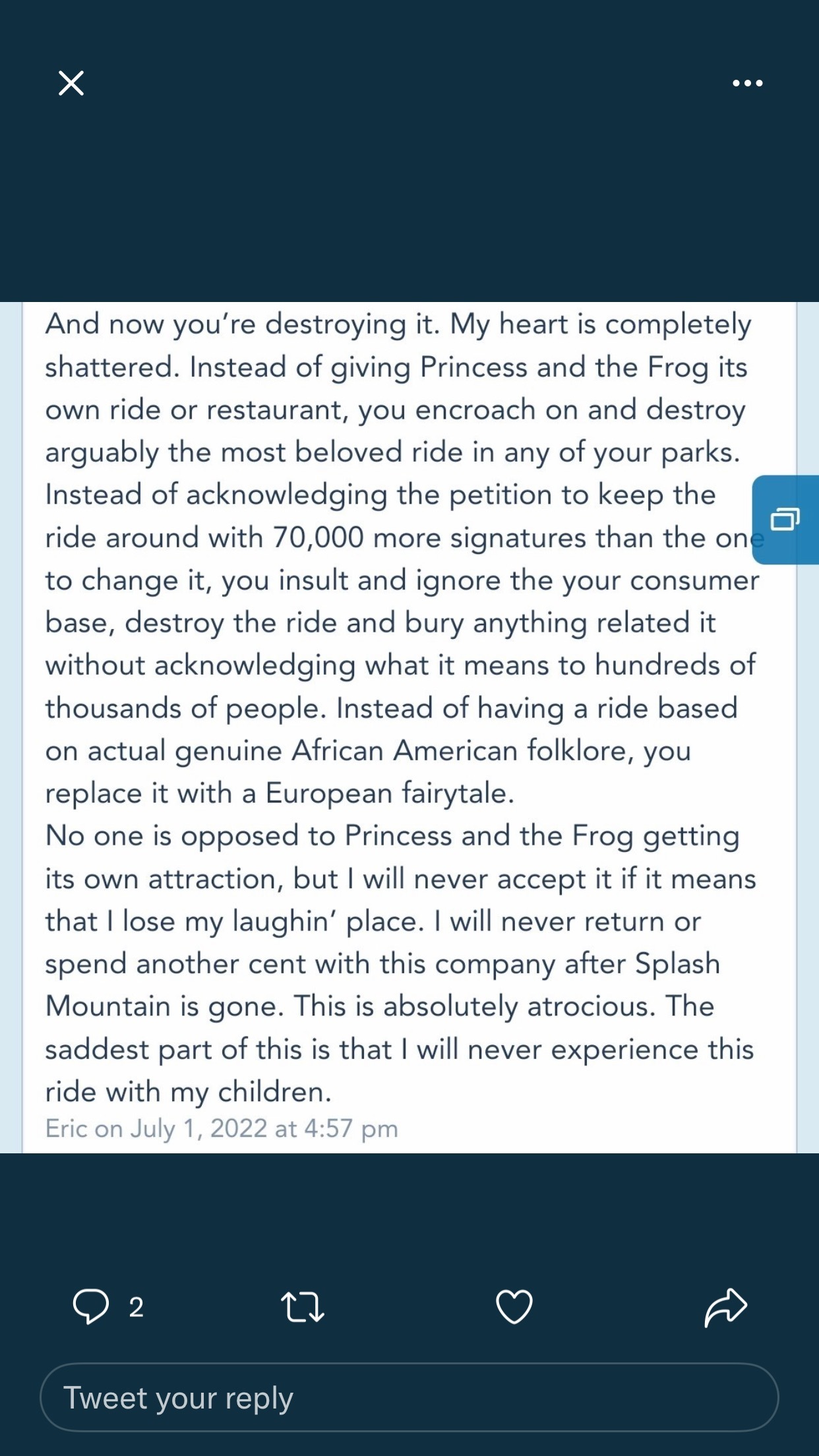
In their critiques of how the film and ride have everyone "hand in hand", they don't acknowledge or don't even care that James Baskett (Uncle Remus in the films) was unable to attend the premiere due to Atlanta, Georgia's segregation laws at the time. And like the Times article mentioned far above, they downplay, ignore, and sometimes outright mock the valid criticisms of the descendants of those whom Joel Chandler Harris took their beloved folklore from and repackaged it for white consumption. This is why many are so angry and heated about the upcoming Princess and the Frog transformation because they're taking a ride based on a film that was designed and centered whiteness for a story and characters that actually centers Blackness.
